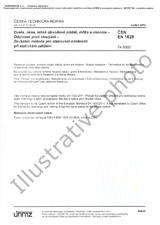We need your consent to use the individual data so that you can see information about your interests, among other things. Click "OK" to give your consent.
ČSN ETSI EN 303981-V1.3.1 (876059)
Satellite Earth Stations and Systems (SES); Fixed and in-motion Wide Band Earth Stations communicating with non-geostationary satellite systems (WBES) in the 11 GHz to 14 GHz frequency bands; Harmonised Standard for access to radio spectrum
Translate name
STANDARD published on 1.3.2023
The information about the standard:
Designation standards: ČSN ETSI EN 303981-V1.3.1
Classification mark: 876059
Catalog number: 516338
Publication date standards: 1.3.2023
SKU: NS-1103185
The number of pages: 80
Approximate weight : 240 g (0.53 lbs)
Country: Czech technical standard
Category: Technical standards ČSN
The category - similar standards:
Radio relay and fixed satellite communications systemsSatellite
Annotation of standard text ČSN ETSI EN 303981-V1.3.1 (876059):
V1.3.1
The present document specifies technical characteristics and methods of measurements for fixed and in-motion Earth Stations communicating with non-geostationary satellite systems (WBES) in the 11 GHz to 14 GHz FSS frequency bands, which have the following characteristics:
- - The WBES is further defined as one of two classes of Earth stations, class A and class B. The clauses in the present document apply to both classes unless separately delineated.
- - The WBES is designed for both in-motion and stationary operation.
- - The WBES operates in-motion on various platforms such as trains, maritime vessels, aircraft and other vehicles and, therefore, may be subject to occasional disturbances and interruptions in the satellite link.
- - The WBES is operating as part of a satellite system used for the provision of broadband communications.
- - The WBES is comprised of all the equipment, electrical and mechanical, from the antenna itself to the interface with other communications equipment on a mobile platform.
- - The WBES comprises one or more emitters and the system overview as given in figure 1 should be interpreted accordingly.
- - The transmit and receive frequencies are shown in table 1.
- - The WBES transmits within the frequency range from 14,0 GHz to 14,50 GHz.
- - The WBES receives within the range from 10,70 GHz to 12,75 GHz.
- - The Class A WBES transmits at elevation angles of 35° or greater, relative to the horizontal plane.
- - The Class B WBES transmits at elevation angles of 25° or greater, relative to the horizontal plane.
- - The WBES uses linear or circular polarization.
- - The WBES communicates with non-geostationary satellites.
- - The WBES is designed for unattended operation.
- - The WBES is controlled and monitored by a Network Control Facility (NCF). The NCF is outside the scope of the present document.
The present document applies to the WBES with its ancillary equipment and its various telecommunication ports, and when operated within the boundary limits of the operational environmental profile as required by its intended use and when installed as required by the intended use or in the user documentation.
NOTE - The relationship between the present document and essential requirements of article 3.2 of Directive 2014/53/EU [i.1] is given in annex A
Preview of the standard ČSN ETSI EN 303981-V1.3.1 (876059)
We recommend:
Technical standards updating
Do you want to make sure you use only the valid technical standards?
We can offer you a solution which will provide you a monthly overview concerning the updating of standards which you use.
Would you like to know more? Look at this page.




 Cookies
Cookies
